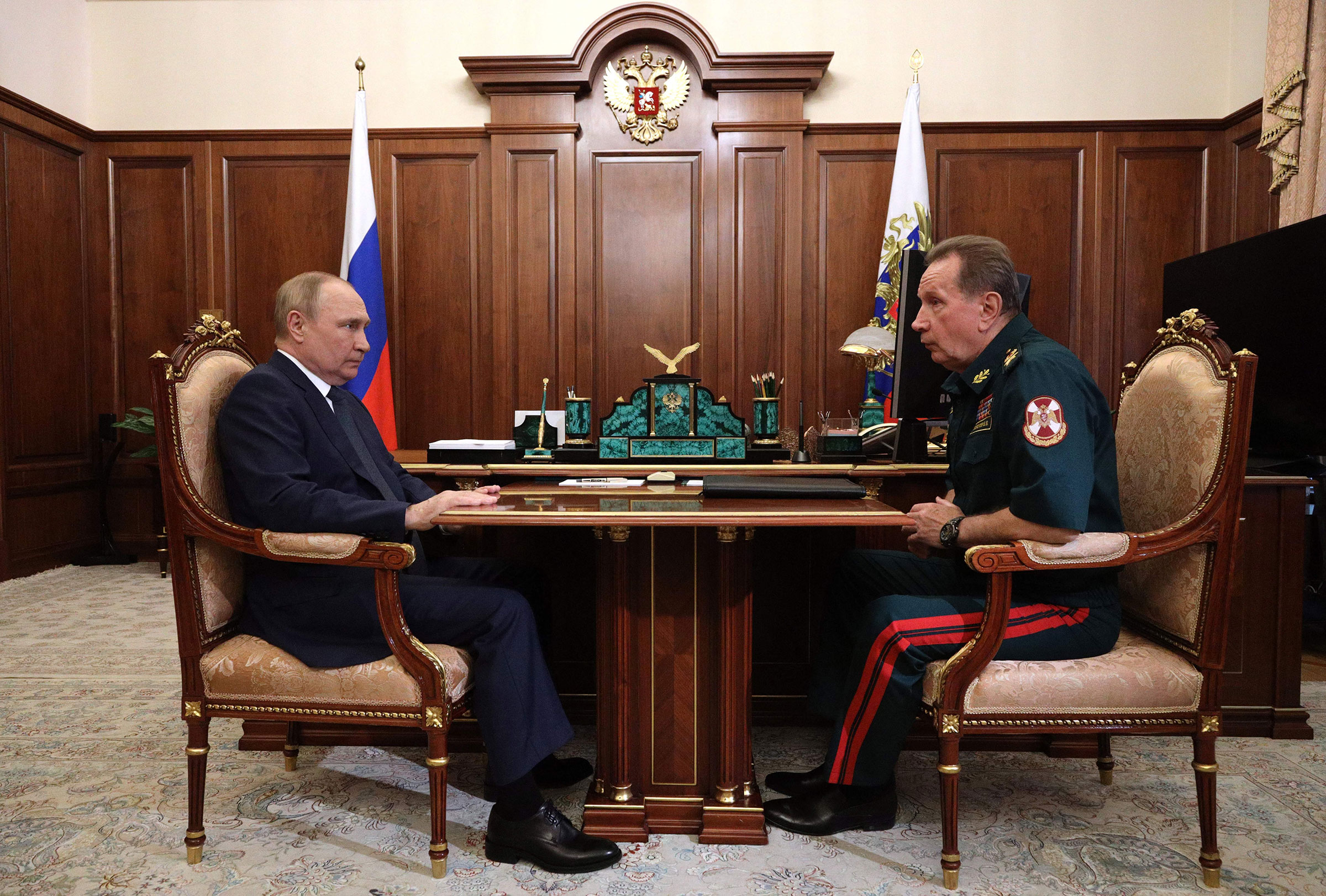For anyone wondering how Russia might change after this weekend’s aborted putsch, it would be worth keeping an eye on Viktor Zolotov, the longtime bodyguard of President Vladimir Putin, who emerged on Tuesday as one of the few apparent winners in the regime’s near-death experience.
A typically grey and sullen figure in the Kremlin retinue, Zolotov, who heads the Russian National Guard, stepped out of Putin’s shadow on Tuesday to claim credit for defending Moscow from the Wagner Group, the private army that marched across Russia this weekend. After meeting with Putin on Monday and Tuesday, Zolotov described how his branch of the armed forces, with over 300,000 personnel, stood to gain from the rebellion. His troops would soon receive an arsenal of advanced weaponry, he said, including tanks, to guard against similar threats to Putin’s rule.
It remains to be seen whether any of the Kremlin’s clans can gain from the Wagner Group’s rebellion. Its leader, Evgeny Prigozhin, has reportedly gone into exile, his mercenaries ordered to disband. His rivals in the Russian military have been humiliated by the fiasco, while Putin has struggled to save face and regain his grip on power. But Zolotov, the consummate loyalist, appears to be taking a victory lap and publicly angling for advantage.
More from TIME
It might be within his reach. In a speech at the Kremlin on Tuesday, Putin thanked the forces under Zolotov’s command for defending the capital alongside the police and other security forces. “You saved the Motherland from turmoil, and effectively stopped a civil war,” Putin told a gathering of troops and officers, including Zolotov and other senior commanders.
All of them, from the defense minister to the nation’s top spies, have kept silent in the last few days, appearing meek and exhausted in a meeting with Putin on Monday. The only one sporting a military uniform at that meeting was Zolotov, who has since become the most outspoken of Russia’s top brass. On Tuesday, he was the first senior official to blame the mutiny on the U.S. and its European allies, offering a familiar canard for the state propaganda channels to spread: “The rebellion,” Zolotov told them, “was inspired by the West.”
Among Putin’s henchmen, Zolotov’s background stands in sharp contrast to that of Prigozhin, the brash mutineer who ordered his men to advance on Moscow over the weekend. A convicted mugger and former hot dog vendor, Prigozhin wormed his way into Putin’s circle through a series of business deals and a willingness to do the state’s dirty work around the world, whether by interfering in American elections or propping up dictators in Africa and the Middle East. Zolotov, a creature of the system and a general of the Russian army, has spent most of his career within the Kremlin walls, starting as a bodyguard to President Boris Yeltsin in 1991 and continuing in that role under Putin.

He first came to public prominence in Russia in 2016, when Putin created the Russian National Guard and appointed Zolotov as its commander. The force, which answers directly to Putin, was designed to put down popular uprisings and internal threats to the regime, a task that Zolotov embraced with gusto. In one of his rare public appearances in 2018, he threatened to pound Russia’s most prominent dissident, Alexei Navalny, into a “juicy slab of meat.”
During the Russian invasion of Ukraine last year, Zolotov’s forces mostly played an auxiliary role, bringing up the rear behind elite commandos and airborne troops tasked with the conquest of Kyiv. When that mission failed, Zolotov did not get nearly as much of the blame as the spy chiefs and generals who planned and executed the invasion. Putin continued to praise the Russian National Guard even as the rest of his military began its retreat from the Kyiv region. “The whole country is proud of every one of you,” Putin told them at the end of March 2022, marking a national holiday celebrated in honor of Zolotov’s forces.
Since that time, many of Russia’s top generals and spy chiefs have been at each other’s throats, struggling to regain momentum in the war and to skirt responsibility for Russia’s catastrophic losses on the battlefield. One of these feuds resulted in Prigozhin’s mutiny over the weekend, and it ended badly both for him and his rivals within the Russian military.
But for Zolotov, it looks like an opportunity, and a sign of the direction that Russia might take. Threatened in Moscow and frustrated in Ukraine, Putin could fall back on the man who has been by his side from the beginning, the one responsible for staving off internal threats to the regime. For Putin, that might seem like a logical move as he steps back from the brink of a civil war. For the rest of the Russian elite, it could herald the beginning of a purge, one that Zolotov would be more than happy to conduct with the forces under his command.
More Must-Reads From TIME
- The 100 Most Influential People of 2024
- How Far Trump Would Go
- Scenes From Pro-Palestinian Encampments Across U.S. Universities
- Saving Seconds Is Better Than Hours
- Why Your Breakfast Should Start with a Vegetable
- 6 Compliments That Land Every Time
- Welcome to the Golden Age of Ryan Gosling
- Want Weekly Recs on What to Watch, Read, and More? Sign Up for Worth Your Time
Contact us at letters@time.com